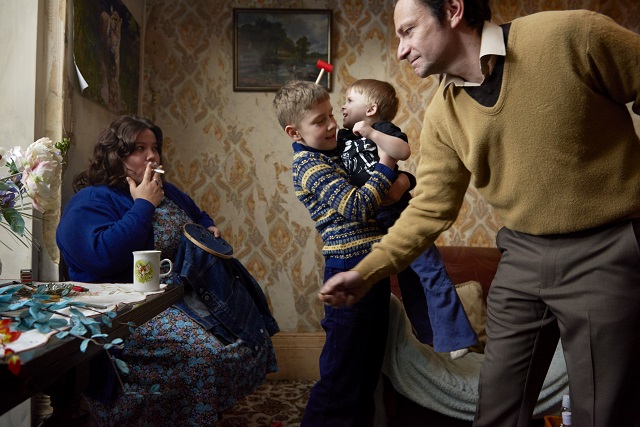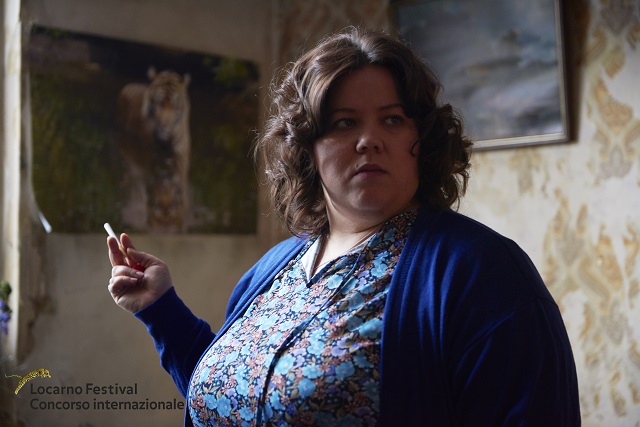
One of the strongest works in the London Film Festival’s excellent selection for the first feature competition, Ray and Liz marks the arrival of an interesting new auteur to British cinema. Like Steve McQueen did a decade ago, Turner-prize nominated artist Richard Billingham bridges the gap between art gallery and art house with this long gestating debut which offers a very personal recollection of his childhood memories as part of a dysfunctional family devastated by the socially damaging policies of the Thatcher era.
Named after his parents, Ray and Liz originated from Billingham’s celebrated photography book Ray’s a Laugh, released two decades ago. The book’s portrayal of his relatives’ dysfunctional way of life, on benefits in their council flat somewhere in the West Midlands, had an enormous impact. The photographer kept on working on the same intimate subject and, in collaboration with producer Jacqui Davies, they developed a project which ended up repurposing it for the big screen.
It began as a short film made for an art exhibition documenting his dad at an older age, ravaged by alcoholism, living alone on a tower block studio that he did not leave for two years. Shot in 16mm and boasting a rigorous sense of framing, it depicted his father’s decrepit room with little furniture, plagued with flies and empty plastic bottles that a neighbour keeps on delivering full of what we suspect is cheap booze. The mostly static shots enhanced the sense of stagnation in a life that seems to be devoid of any hope or personal development.
After a second short, the director thought that with further work it all could be shaped into this full feature, which so far has become one of the success stories of this year’s festival circuit. In total four different vignettes reflect on four harrowing moments of Billingham neglecting family’s history, including the time they lost the custody of his brother’s Jason, sent to foster parents. They also boast a dark sense of humour, particularly in the central part, when the couple needs to go and buy shoes for their older child and leave mentally disabled uncle Lol to care for the younger, Jason. When their teenage lodger arrives, he uses Liz’s hidden alcohol crate to get him drunk, steal his money and stageing the scene leaving a knife in the hands of the baby for Lol to take all the blame. It depicts a family environment in moral freefall where bullying, lying and stealing was commonplace and the usual emotional bonds, support and solidarity among its members have disappeared.

Ray and Liz excels on its visual aspects and strong sense of place. Daniel Landin’s cinematography focuses with meticulous detail in shooting the objects; pets; cheap paintings; paper walls and general decorative tat inserted among shots of the family’s rather basic everyday rituals. Yet perhaps its biggest weakness is a certain lack of empathy. For a film whose title is the names of its two main characters, it is somehow surprising how little we get to know about them, beyond their rather one-dimensional misery. Being based on a personal memorir of a terribly harrowing childhood, the film seems to be an exercise for the director to confront and exorcise the issues surrounding his relationship with his parents, but avoiding to explore the causes that led them to their sorry situation, also steals the film’s chance of a potentially bigger emotional resonance.
The bleak comic touches reinforce the viewer’s impression of Ray and Liz as the stereotypically lazy, prone to addiction, depending on government support, neglecting parents; something that’s dangerously close to the current conservative narratives demonizing poor people by blaming them for their own fate. The only time we see them as potentially normal human beings is when an old photograph of their younger selves is shown, as a brief reminder that perhaps they were once a loving couple, with hopes and dreams for a future that turned against them. There’s also a moment of regret in the last part when Ray as an older man ravaged by his alcoholism, listening to an oldie hit in the radio, tearfully recalls his life. But as a memoir of a troubled family past and how an adult tries to cope with its consequences, Ray and Liz is still a powerful, beautifully filmed, very intimate statement.★★★½